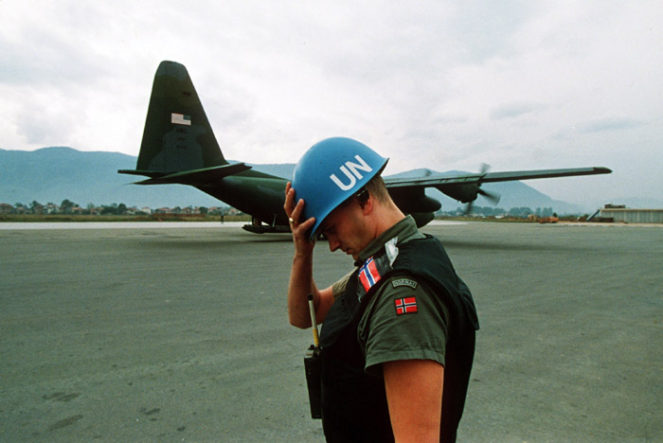UN Peacekeeping Hesitates to Take Life-saving Action
 Two months ago, rogue South Sudanese troops broke into the Terrain Hotel in South Sudan's beleaguered capital of Juba. The situation surrounding the war tearing apart South Sudan is complex, but what happened after those soldiers gained entry was very simple. According to The Guardian, soldiers told victims, “either you have sex with me, or we make every man here rape you and then we shoot you in the head.”
Two months ago, rogue South Sudanese troops broke into the Terrain Hotel in South Sudan's beleaguered capital of Juba. The situation surrounding the war tearing apart South Sudan is complex, but what happened after those soldiers gained entry was very simple. According to The Guardian, soldiers told victims, “either you have sex with me, or we make every man here rape you and then we shoot you in the head.”
The rape and murder on the night of July 11 was not inevitable. 17,000 UN peacekeepers are stationed in South Sudan. A UN base is situated one mile from the entrance of the Terrain Hotel. Many of the men and women killed that night spent their last minutes making desperate calls to those very same UN forces. Nothing happened. Beyond the failure of South Sudan to create a functioning state, this incident highlights the greater failure of the United Nations to live up to its own principles and affect any practical change on the ground.
The United Nations was founded largely as the international community’s response to the horror of the Second World War and the Holocaust. Starting with the UN charter itself, the 1948 declaration on genocide and countless resolutions since then, the UN has peppered the world with rhetoric on the unique egregiousness of genocide.
Yet, the Holocaust was hardly the world’s last genocide. Since World War II, genocides have occurred in Bangladesh, East Timor, Cambodia, Guatemala, Bosnia, Rwanda, Congo, Darfur, Syria/Iraq, Central African Republic and now South Sudan. How can an organization that is dedicated to protecting civilians so consistently fail?
Many point the blame for UN Peacekeeping failures towards the program’s lack of funding. However, Peacekeeping enjoys the UN’s largest budget, which has increased 16-fold since 2000. Others say that developed nations’ reluctance to send their own better trained and better equipped troops to serve contributes to peacekeepers’ failure to fulfill their mission and keep the peace. However, advanced militaries would not fix the core problem. UN peacekeepers do not fail because they are outmanned and outgunned; they fail because they hesitate to take a stand.
“There are killings and New York doesn’t give a damn” are the words of one peacekeeper in Rwanda ordered to stand down. India’s ambassador to the UN said that “peacekeeping is not an end in itself” to justify why peacekeepers should refrain from intervention. Both are prime examples of the most glaring and fundamental failure of the UN in its peacekeeping operations: the pervasive lack of will to engage in combat even if that means imminent danger for civilians.
Furthermore, even when commanders have direct orders to use force, they are known to supersede orders from the UN and defer to their own national chain of command. This was the case when M23 rebels overran Goma, Eastern Congo’s largest city, in 2012. Ordered to hold the city, the Indian general in command of the largest UN force in history stood aside at the orders of New Delhi. Under pressure from Indian officials, the UN failed to sack him from command.
Time and time again UN peacekeeping demonstrates its weakness and ineffectiveness, translated directly into devastating and violent loss of life. Many of the most heinous crimes against humanity since WWII have been committed within view of blue helmets. Excuses ranging from respect of sovereignty to political deadlock to structural inefficiency abound, but if the UN truly dedicated itself to keeping the scourge of genocide from ever seeing the world, politics would not matter.
In the meantime 4,000 new peacekeepers have been deployed to South Sudan in the wake of the most recent massacre. Couched in lofty promises, it is difficult to imagine 4,000 troops failing to protect like their 17,000 predecessors in South Sudan. Until the UN alters its conception of peacekeeping, and peacekeepers are emboldened and trained to act, innocents will continue to suffer.
C had is an undergraduate in the School of Foreign Service majoring in International Politics with a concentration in Security. Outside of academics Chad is an avid photographer and traveller.
had is an undergraduate in the School of Foreign Service majoring in International Politics with a concentration in Security. Outside of academics Chad is an avid photographer and traveller.
